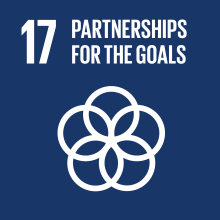
Partnerships for Goals
Revitalizing global partnerships for a sustainable future and strengthen the implementation of these goals.
The world needs to come together to better the planet. This is not something a few countries can do alone. Working together creates a synergistic effect that will spread to everyone if we do this correctly. Learn about the global partnerships UB has in creating a better world.
The Long Game: Insights from 18 Years of Co-Production of Knowledge [1:29:50]
The UB Food Lab team has a long-standing, award winning community action research partnership with the Massachusetts Avenue Project (MAP), a local not-for-profit group that aims to build capacity of youth by engaging them in food systems transformation. The partnership began in 2002 with a graduate planning practicum taught by Dr. Samina Raja on behalf of MAP. Over the years, the UB Food Lab has documented the impact of MAP's work on the food policy landscape in the city, and worked with MAP to strengthen the food system. (UB Community for Global Health Equity, 11/11/20)
Now What?! Advocacy, Activism, and Alliances in American Architecture since 1968 [1:21:54]
Opening Presentation and Panel Discussion | The Now What?! exhibition examines the little-known history of architects and designers working to further the causes of the civil rights, women’s, and LGBTQ movements of the past fifty years. A presentation and panel discussion on the exhibition's opening night will feature talks by Lori Brown (Syracuse University), Sarah Rafson (Point Line Projects) and Roberta Washington (Roberta Washington Architects), with a special presentation by Robert T. Coles, FAIA, and a conversation with Joyce Hwang, Kelly Hayes McAlonie and Beth Tauke of UB. An exhibit opening reception in the Hayes Hall atrium will follow.(School of Architecture and Urban Planning, 4/23/19)
UB World's Challenge Challenge Competition 2019 [1:28:35]
Seven teams of students from diverse academic backgrounds took the stage in teams of three to pitch their world changing idea. Congrats to Numu Burger for placing first and moving on to the global final in Western University (where they took the bronze out of twenty teams from around the world!).
Lessons Learned from Lifelong Social Activists: Overcoming Barriers to Activism
Samantha Fletcher, MSW, shares what she learned by interviewing and studying the work of lifelong social activists. She discovered how these change agents navigated a lifetime of social activism, what sustained them, and how they responded to the inevitable setbacks and barriers. The stories and lives of these committed persons provide ample insight and implications for social work practice. (School of Social Work, 4/23/18)
The Anti-Racism Project: A Strategy for Preparing Social Work Educators
The NASW Code of Ethics and International Federation of Social Workers’ "Statement of Ethical Principles" call for social workers to challenge discrimination, oppression, and "unjust policies and practices." In the United States, racism remains a lasting and pernicious example of those injustices. In this podcast, Dr. Ashley Davis and Dr. Allyson Livingstone describe the development of their Anti-Racism Project. The discussion includes their experience as the Project's facilitators and group members, research connected to the Project, and their advocacy for the need to include equity work in social work doctoral education. They also identify four important themes that seemed to emanate from their work. (School of Social Work, 2/29/16)
Exploring Opportunities for Social Impact and Social Innovation through Public-Private Partnerships
Lakshmi Iyer discusses her work at FSG, a mission-driven consulting firm that is dedicated to advising corporate, foundation, and nonprofit leaders. She describes how philanthropy and corporations can be viewed skeptically and are often misunderstood by social work and explains how for-profit organizations can help solve social issues and create an impact through collaborative partnerships. Models of social innovation and entrepreneurship are summarized and examples of how social workers can serve as change agents are discussed. Social change approaches utilized by organizations and their connection to social work education, research and practice - including how these strategies address current silos - are explored. (School of Social Work, 12/16/19)
Sustainable Courses
- ARC 605: Arch Design Studio Abroad.
- END 120: Intro to Urban Environment.
- END 212: Urban & Environmental Planning.
- END 279: Explore Design Buffalo Niagara.
- END 428: Found Historic Preservation.
- URP 580: Arch & Urban Planning Practicum.
- CDN 345: Canadian Politics.
- CL 228: War in Anc Mediterranean World.
- DMS 333: World Cinema.
- EVS 317: The Politics of Sustainability.
- EVS 442: Environmental Movements.
- EVS 238: Science, Religion, and Nature.
- EVS 460/560: Leadership in Sustainability.
- GEO 112: International Health.
- GEO 333: International Trade.
- GEO 460: Geography of Development.
- GEO 334 / 634: International Business Cultures.
- GLY 102: Climate Change.
- HIS 141: Human Origins of Global South.
- HIS 143: Global Inequality and Power.
- HIS 217: Civil Rights in America.
- JDS 284: Justice.
- JDS 396: Religion, Science, and Politics.
- PHI 234: Environmental Ethics.
- PHY 121: Descriptive Astronomy 1.
- PHY 122: Descriptive Astronomy 2.
- PSC 101: Intro American Politics.
- PSC 102: Intro International Politics.
- PSC 103: Intro to Comparative Politics.
- PSC 215: Law & Political Process.
- PSC 222: Politics & Society.
- PSC 305: Judicial Process.
- PSC 333: International Relations Theory.
- PSC 343: Politics of Domestic Unrest.
- PSC 500: Intro Political Inquiry.
- PSC 505: American Politics.
- SOC 211: Sociology of Diversity.
- TH 220: Performing America.
- UGC 111: World Civilization 1.
- UGC 112: World Civilization 2.
- CIE 461: Sustainability.
- CSE 442: Software Engineering Concepts.
- LAI 520: Intro to Social Education.
- MGT 401: Public Policy, Law, and Management.
- PUB 210: Global Public Health.
- PUB 220: Behavioral & Social Influence on Health.
Communicate your actions to achieve the global goals by using the hashtag #globalgoals on social networks.






























